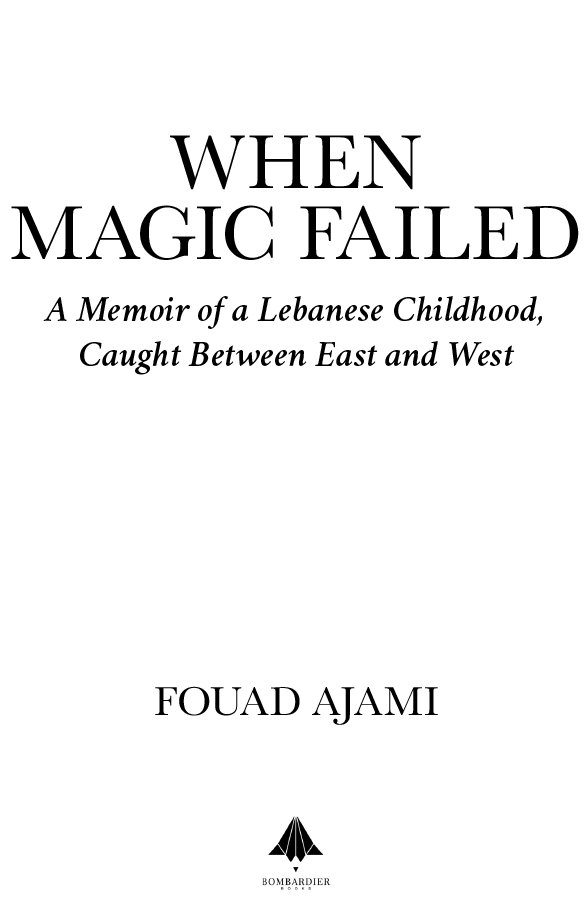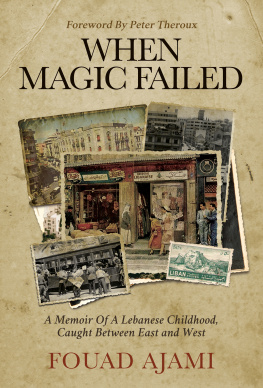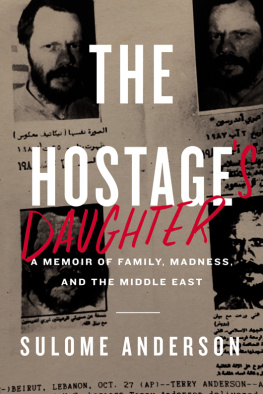Advance Praise for When Ma gic Fa iled
I have never read a more enchanting account of disenchantment, just as I have never known a man more independently immersed in his culture than Fouad Ajami. When Magic Failed is an uncanny monument to both love and truth. Lucidly and lyrically, it dotes on the world that it leaves. This is a beautiful and honorable book.
Leon Wieseltier
In this powerfully written memoir, the late Fouad Ajami tells a story of profound disruption whose central theme is the impact of the modern world on the Shiite villagers of southern Lebanon. The narrative begins with a mother killing her daughter to shield her family from shame, and ends soon after a young manthe authorleaves Beirut to study political science in the United States. In between are a series of intimate portraits of men and women whose lives are variously destroyed, blighted, enlivened, or blessed by winds of change that can reach gale force. The characterization is acute, and the characters are unforgettable.
Michael A. Cook

BOMBARDIER BOOKS
An Imprint of Post Hill Press
ISBN: 978-1-63758-175-9
ISBN (eBook): 978-1-63758-176-6
When Magic Failed:
A Memoir of a Lebanese Childhood, Caught Between East and West
2022 by Michelle Ajami
All Rights Reserved
Cover Design by Tiffani Shea
Beaufort Castle 1982 Courtesy of david55king, CC BY 2.0
, via Wikimedia Commons.
All people, locations, events, and situations are portrayed to the best of the authors memory. While all of the events described are true, many names and identifying details have been changed to protect the privacy of the people involved.
No part of this book may be reproduced, stored in a retrieval system, or transmitted by any means without the written permission of the author and publisher.


Post Hill Press
New York Nashville
posthillpress.com
Published in the United States of America
Contents
For Leila and Darius
It was in the mid-1990s that my editor at W.W. Norton contacted me to help clear the companys list of books under contract that it probably would never see. We agreed to cancel plans for a novel I had once promised, but that was long overdue, without any regret. In fact, this companywide clearing of the decks was a great relief to everyone involved, she confided to me, Except in the case of a memoir we wanted from Fouad Ajami, about growing up Shiite in southern Lebanon.
I could sympathize. At the time I had never met Fouad, whom I admired greatly for his expertise on Middle Eastern literature and politics, and his beautiful prose, but our paths had not yet started crossing, except for a coincidence of shared interests. Fouad published his definitive The Vanished Imam: Musa al Sadr and the Shia of Lebanon the year before my little-noticed book, released only in London, The Strange Disappearance of Imam Moussa Sadr in 1987. I was both crushed and excited but dearly hoped he eventually would produce the memoir. In any case, two years later, in Beirut: City of Regrets , he sketched some details of the world of his youth:
When we arrived in Beirut, it still had the feel of a large town. There were sand dunes on Beiruts southern approaches. And in the northeastern sector of the city when we first moved into a largely Armenian neighborhood, there were orange orchards, a forest of pine trees, two or three strawberry fields [in] this squatter settlement which the Armenians had buil t up.
You had to look at this retro postcard of midcentury Lebanon with nostalgia and amazement. Orange orchards and pine forests in Beirut? And the muddy Armenian settlement he described I knew four decades later as the dynamic suburb of Bourj Hammoud, where Lebanese-Armenian friends always pressed me to bring them BH car decals from Beverly Hills, on my next visit from Los Angeles. Lebanons ups and downs have made it the most enthralling of time capsules, and Beirut itself has been well documented.
Southern LebanonFouads ancestral homewas altogether different. It was from that hinterland that the Ajami family would make its journey to the cosmopolitan world of the city. Successive erasures of Jabal Amil, from the Ottoman rule of Ahmad Pasha al-Jazzar, who incinerated its written history in the late 18 th century, to Hizballah, which turned it to an armed campnow largely closed off to the worldhad made that gambit urgent but ever more challenging. We have had to wait for When Magic Failed for a full account of this lost world.
After the tantalizing hints and fragments of autobiography Fouad had shared in various previous writings, When Magic Failed pulls back the veil on so much of what is unspoken. We start in medias res with an honor killingand not a mere sketch but the deep story with all the personalities, competing societal stresses, muzzled dreams and contempt, the deed, and the aftermath.
Before being introduced to Beirut and the relatives striving against the odds in Saudi Arabia and West Africa, we find ourselves in a feudal and even medieval world where women still dried and saved cow dung for fuel, where children used the bones of dead animals for toys, and where these women led laundry-laden donkeys past a Crusader fortress downhill to the bristling rapids of the river. Reader, have a look at Arnoun via Google Earth. These women steered their beasts down a 1,000-foot steep slope beside Beaufort Castle to the Litani River and back again, uphill to their chores, hardships, and husbands.
Fouads mother Bahija, in particular had an uphill journey in life. She had married young to a sayyid from Jibshit, a harsh Jabal Amil village that would fall easily and early to Hizballah in the 1980s (the hometown of Sheikh Ragheb Harb, the ayatollah of the suicides). Abused and unhappy, she left that husband, and returned to Khiam the divorced mother of three, though without custody. Bahija then married Ali Ajami, and Fouad would be their second son. Ali would soon take up with a younger woman in nearby Nabatiyya.
It is Bahija whose character shaped not only Fouad but also his memoir. Her courage and spirit in the face of misfortune and constant humiliation seem to have imparted to Fouad his enduring passion for championing the underdog.
I was and remained a discarded child of a discarded marriage, Fouad writes, but Bahija bravely used her leverage as the mother of sons with her father-in-law, Sheikh Muhammad, to preserve her dignity and that of her two sons. When Fouad moved to Beirut for schooling at a rather dubious schoolhouse founded by his father, she followed.
Poor, unlettered, single, twice-divorced, this woman from the south of Lebanon had a survivalist mission in life that left her unintimidated by the Lebanese capital. Not that rural relatives did not cause embarrassment on their forays into glittering Beirut.
We had older relativeswomen with tattoos on their hands and their chins, women with head covers; men with red fezzes carrying baskets of figs and buckets of yogurtwho showed up right when the new city was about to be mastered, arriving unannounced to my remind [us] where we had come from. Abu Fawzi, the old great -u ncle with the red fez and the red face, came to West Beirut with a live chicken as a present for his embarrass ed ni eces.
Fouads generation was the bridge between the world of the ancestors and the modern post-war landscape of possibilities and change. Both gods demanded their tribute, but the political winds that were sweeping through the Third World transfixed the Lebanese youth. Fouad writes vividly of the wave of Gamal Abdel Nassers popularity, during his teenage years. Nassers politics, and the influence of the PLO when it moved from Jordan to Lebanon, sowed the early seeds of Lebanons dark future, the narcotic of Arab nationalism that led to the 1967 military catastrophe, and Yasser Arafats crew whose inner cadres would train the likes of Imad Mughniyeh, paving the way for the Iranian IRGCs virtual takeover of Lebanon. The pious Bahija, with a villagers attachment to the land, was unimpressed by the great political questions:
Next page










